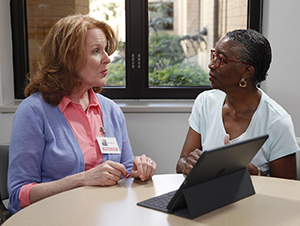Aphasia is a loss of language skills that includes understanding or producing language. Aphasia often happens after a stroke. But it can also happen from brain injury, tumors, or other problems with the nervous system. People with aphasia may not be able to express their thoughts (expressive aphasia). Or they may not be able to understand others (receptive aphasia).
Signs of aphasia
Signs of aphasia vary with each person. A person with aphasia may show some or all of the signs below.
A person with aphasia may not be able to:
-
Understand words when others speak.
-
Speak in complete sentences.
-
Read or write.
-
Understand that numbers have meaning.
A person with aphasia may:
-
Speak using only nouns and verbs.
-
Mix up the order of words in a sentence.
-
Use the wrong words or made-up words.
-
Have trouble working with numbers, such as balancing a checkbook.
Practical tips for aphasia
A person with aphasia may still think and understand, even if responding is hard. Try to:
-
Ask questions that can be answered with a yes or a no.
-
Speak slowly and clearly in simple sentences. Use simple words, but don’t “talk down” to the person.
-
Give the person time to understand and to respond. Try not to speak for the person unless you must.


